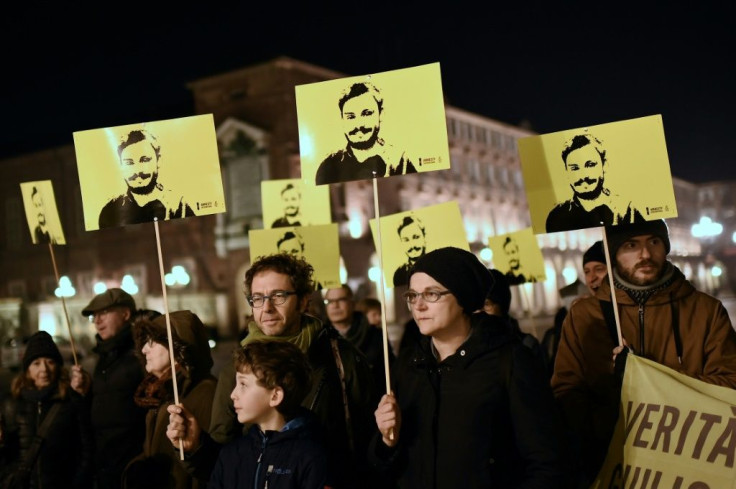Italian Court Tries Egyptian Officers Over Student's Murder
Four Egyptian security officers went on trial in absentia in Italy Thursday for the brutal killing in Cairo five years ago of Italian student Giulio Regeni.
The officers stand accused of kidnapping, conspiracy to murder and grievous bodily harm in the case, which sparked outrage in Italy and has strained diplomatic relations with Egypt.
Regeni's parents and sister were present at the hearing in the bunker room of Rebibbia prison, often the stage for mafia trials.
The 28-year-old was doing research for a doctorate at Cambridge University when he was abducted in January 2016.
His body, bearing extensive signs of torture, was eventually found dumped on the outskirts of Cairo, naked from the waist down.
Italian Foreign Minister Luigi Di Maio welcomed the first hearing in Rome as "a result unhoped for in the weeks following the discovery of Giulio's body", when the case looked unsolvable.
The government said it was joining the proceedings with a civil suit for damages, in a symbolic show of support for the Regeni family.
But the trial may collapse before it begins.
The court must first rule on whether the four suspects, members of Egypt's National Security Agency (NSA), are aware of the proceedings against them, as required by law. Egypt has refused to provide their contact details.
At a preliminary hearing in May, a judge ruled that media coverage meant news of the investigation into the four would have reached them. That decision may be upheld or overturned by the court on Thursday.
"After five and a half years, we want a trial," Regeni family lawyer Alessandra Ballerini said, saying the student had been caused "a world of pain".
She told the court there was "ample evidence" the men cannot be ignorant of the trial.
The four are named in court documents as General Tariq Sabir, Colonels Athar Kamel and Uhsam Helmi and Major Magdi Ibrahim Abdelal Sharif, who is accused of carrying out the killing.

Investigators believe Regeni was abducted and killed after being mistaken for a foreign spy.
Prosecutor Sergio Colaiocco told the court that eye witness testimony and other "significant elements of proof" implicated the security officers in the murder.
All four not only knew about the trial but had "systematically and persistently acted to slow and block the investigation", he said.
He said they had all been questioned in 2018 by the NSA, five months after Italy informed Egypt they were investigating them, and it was "improbable" that the NSA did not tell them they were official suspects.
Furthermore, he argued that as members of the NSA, the defendants were "experts in intelligence gathering and examining data", and could not possibly have missed the media coverage of the case in Egypt and beyond.
Regeni's corpse was found nine days after he disappeared. His mother later said it had been so badly mutilated she only recognised her son by the "tip of his nose".
Five of his teeth had been broken, 15 of his bones had been fractured and letters had been inscribed into his flesh, lawyer Ballerini said.
Court-appointed defence lawyer Tranquillino Sarno told AFP the trial would "stand or fall" on whether key eyewitnesses central to the prosecutor's case made it to Rome to testify in person.
As part of his work for a doctorate, Regeni had been researching Egyptian trade unions, a particularly sensitive political issue.
His murder triggered fresh criticism of Egypt's human rights record under President Abdel Fattah al-Sisi.
Claudio Francavilla from Human Rights Watch told journalists in Rome Wednesday the trial was being closely watched as "a symbol of hope for Egyptians".
© Copyright AFP {{Year}}. All rights reserved.





















